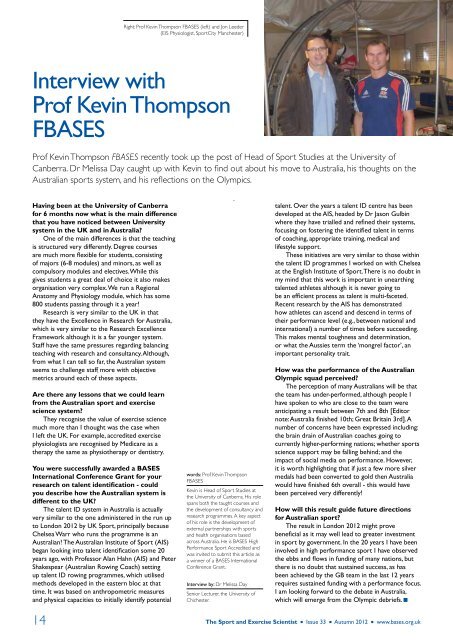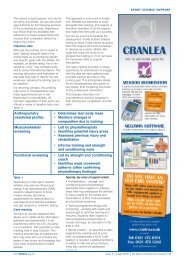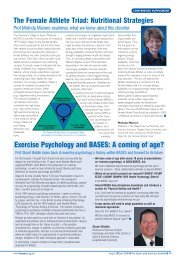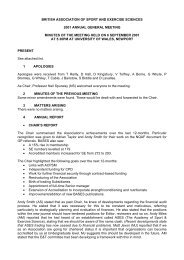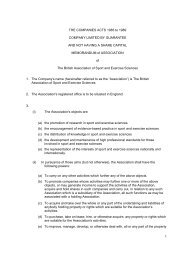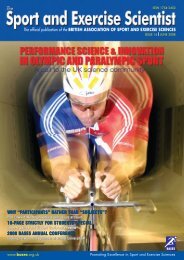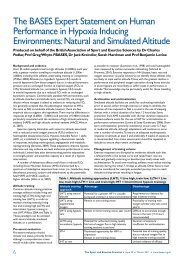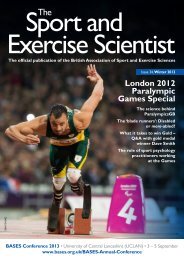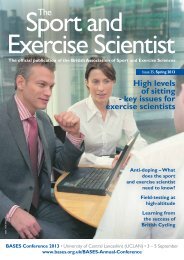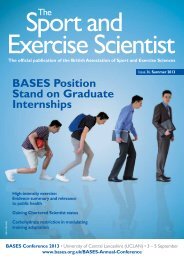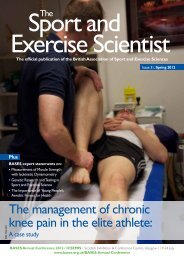Issue 33 Autumn 2012 - Bases
Issue 33 Autumn 2012 - Bases
Issue 33 Autumn 2012 - Bases
- No tags were found...
Create successful ePaper yourself
Turn your PDF publications into a flip-book with our unique Google optimized e-Paper software.
Right: Prof Kevin Thompson FBASES (left) and Jon Leeder(EIS Physiologist, SportCity Manchester)Interview withProf Kevin ThompsonFBASESProf Kevin Thompson FBASES recently took up the post of Head of Sport Studies at the University ofCanberra. Dr Melissa Day caught up with Kevin to find out about his move to Australia, his thoughts on theAustralian sports system, and his reflections on the Olympics.Having been at the University of Canberrafor 6 months now what is the main differencethat you have noticed between Universitysystem in the UK and in Australia?One of the main differences is that the teachingis structured very differently. Degree coursesare much more flexible for students, consistingof majors (6-8 modules) and minors, as well ascompulsory modules and electives. While thisgives students a great deal of choice it also makesorganisation very complex. We run a RegionalAnatomy and Physiology module, which has some800 students passing through it a year!Research is very similar to the UK in thatthey have the Excellence in Research for Australia,which is very similar to the Research ExcellenceFramework although it is a far younger system.Staff have the same pressures regarding balancingteaching with research and consultancy. Although,from what I can tell so far, the Australian systemseems to challenge staff more with objectivemetrics around each of these aspects.Are there any lessons that we could learnfrom the Australian sport and exercisescience system?They recognise the value of exercise sciencemuch more than I thought was the case whenI left the UK. For example, accredited exercisephysiologists are recognised by Medicare as atherapy the same as physiotherapy or dentistry.You were successfully awarded a BASESInternational Conference Grant for yourresearch on talent identification - couldyou describe how the Australian system isdifferent to the UK?The talent ID system in Australia is actuallyvery similar to the one administered in the run upto London <strong>2012</strong> by UK Sport, principally becauseChelsea Warr who runs the programme is anAustralian! The Australian Institute of Sport (AIS)began looking into talent identification some 20years ago, with Professor Alan Hahn (AIS) and PeterShakespear (Australian Rowing Coach) settingup talent ID rowing programmes, which utilisedmethods developed in the eastern bloc at thattime. It was based on anthropometric measuresand physical capacities to initially identify potentialwords: Prof Kevin ThompsonFBASESKevin is Head of Sport Studies atthe University of Canberra. His rolespans both the taught courses andthe development of consultancy andresearch programmes. A key aspectof his role is the development ofexternal partnerships with sportsand health organisations basedacross Australia. He is BASES HighPerformance Sport Accredited andwas invited to submit this article asa winner of a BASES InternationalConference Grant.Interview by: Dr Melissa DaySenior Lecturer, the University ofChichester.talent. Over the years a talent ID centre has beendeveloped at the AIS, headed by Dr Jason Gulbinwhere they have trialled and refined their systems,focusing on fostering the identified talent in termsof coaching, appropriate training, medical andlifestyle support.These initiatives are very similar to those withinthe talent ID programmes I worked on with Chelseaat the English Institute of Sport. There is no doubt inmy mind that this work is important in unearthingtalented athletes although it is never going tobe an efficient process as talent is multi-faceted.Recent research by the AIS has demonstratedhow athletes can ascend and descend in terms oftheir performance level (e.g., between national andinternational) a number of times before succeeding.This makes mental toughness and determination,or what the Aussies term the ‘mongrel factor’, animportant personality trait.How was the performance of the AustralianOlympic squad perceived?The perception of many Australians will be thatthe team has under-performed, although people Ihave spoken to who are close to the team wereanticipating a result between 7th and 8th [Editornote: Australia finished 10th; Great Britain 3rd]. Anumber of concerns have been expressed including:the brain drain of Australian coaches going tocurrently higher-performing nations; whether sportsscience support may be falling behind; and theimpact of social media on performance. However,it is worth highlighting that if just a few more silvermedals had been converted to gold then Australiawould have finished 6th overall - this would havebeen perceived very differently!How will this result guide future directionsfor Australian sport?The result in London <strong>2012</strong> might provebeneficial as it may well lead to greater investmentin sport by government. In the 20 years I have beeninvolved in high performance sport I have observedthe ebbs and flows in funding of many nations, butthere is no doubt that sustained success, as hasbeen achieved by the GB team in the last 12 yearsrequires sustained funding with a performance focus.I am looking forward to the debate in Australia,which will emerge from the Olympic debriefs.14 The Sport and Exercise Scientist n <strong>Issue</strong> <strong>33</strong> n <strong>Autumn</strong> <strong>2012</strong> n www.bases.org.uk


